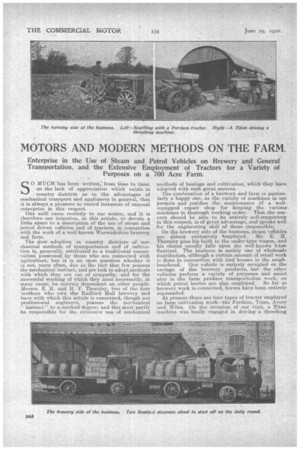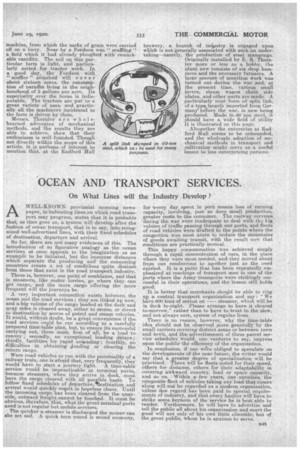MOTORS AND MODERN METHODS ON THE FARM.
Page 26

Page 27

If you've noticed an error in this article please click here to report it so we can fix it.
Enterprise in the Use of Steam and Petrol Vehicles on Brewery and General Transportation, and the Extensive Employment of Tractors for a Variety of Purposes on a 700 Acre Farm.
S0 MUCH has been written, from time to time, on the lack of appreciation which exists in country districts as to the advantages of mechanical transport and appliances in general, that
• it is always a pleasure to record instances of unusual enterprise in this respect.
One sun_ came recently to our notice, and it is therefore our intention, in this article, to devote a little space to a description of the use of steam and petrol driven vehicles and of tractors, in connection with the work of. a well-known Warwickshire brewery and farm.
The slow adoption in country districtsof mee chanical methods of transportation and of cultivation is, generally, attributed to a traditional conservatism possessed by those who are connected with agriculture, but it is an open question whether it is not, more often due to the fact that few possess the mechanical instinct, and are loth to adopt. methods with which they are out of sympathy, and for the successful working of which they must necessarily, in many cases, be entirely dependent on other people. Messrs. E. R. and H. F. Thornley, two of the four brothers who own the Radford Hall brewery and farm with which this article is concerned, though not professional engineers, possess the mechanical instinct" to a marked degree, and this must partly be .responsible for the extensive use of mechanical
methods of haulage and cultivation,which they have adopted with such great success.
The combination of a. brewery and farm is particularly a happy one, as the variety of machines in use permits and justifies the maintenance of a wellequipPed repair shop fer keeping the various machines in therough working order. ' That the concern should be able to be entirely golf-supporting in this respect, is of great advantage, and speaks vell for the engineering skill of those responsible. On the brewery side of tile business, steam vehicles are almost exclusively t mployed. Mr. E. H. Thornley pins his faith to the under-type wagon, and his choice usually falls upon the well-known 6-ton Sentinel. The business is mainly one of wholesale distribution, although a certain amount. of retail work is done in conm.,-etion with tied houses in the neighbonrhood. One vehicle is entirely occupied on the cartage of the brewery products, bur. the other vehicles perform a variety of purposes and assist also in the farm produce transportation work, on which petrol lorries are also employed. So far as brewery work is concerned, horses have been entirely superseded. At present there are four types of tractor employed on farm cultivation work—the Fordson, Titan, Avery and Wiles. On the occasion of our visit, a Titan . machine was busily engaged in driving a threshing • about sixteen acres, the consumption of paraffin being in the neighbourhood of 3 gallons per acre. Its superiority over the horse is indisputable. The tractors are put to a great variety of uses, and practically all the machinery incidental to the farm is driven by them.
Messrs. Thorilley are w hol ehearted advocates of mechanical methods, and the results they are able to achieve, show that their enthusiasm is well founded. Though not directly within the scope of this article, it is perhaps of interest to mention that, at the Radford 'Hall brewery, a, branch of imijustry is engaged upon which is not generally associated with such an under
taking—namely, the production of steel stampings. Originally installed by E. R. Thornley more or less as a hobby, the plant now consists of six drop hammers and the necessary furnaces. A large amount of munition work was turned out during the war and, at the present time, various small levers, steam wagon chain side plates, and other parts are made. A particularly neat form of split link, of a typq largely imported from Germany' before the war. is now being produced. Made in 60 ton steel, it _should have a wide field of utility It is illustrated on this page.
Altogether the enterprise at Radford Hall seems to be unbounded, and the wholesale. adoption of mechanical methods in transport and cultivation might serve as a useful lesson to less enterprising persons.














































